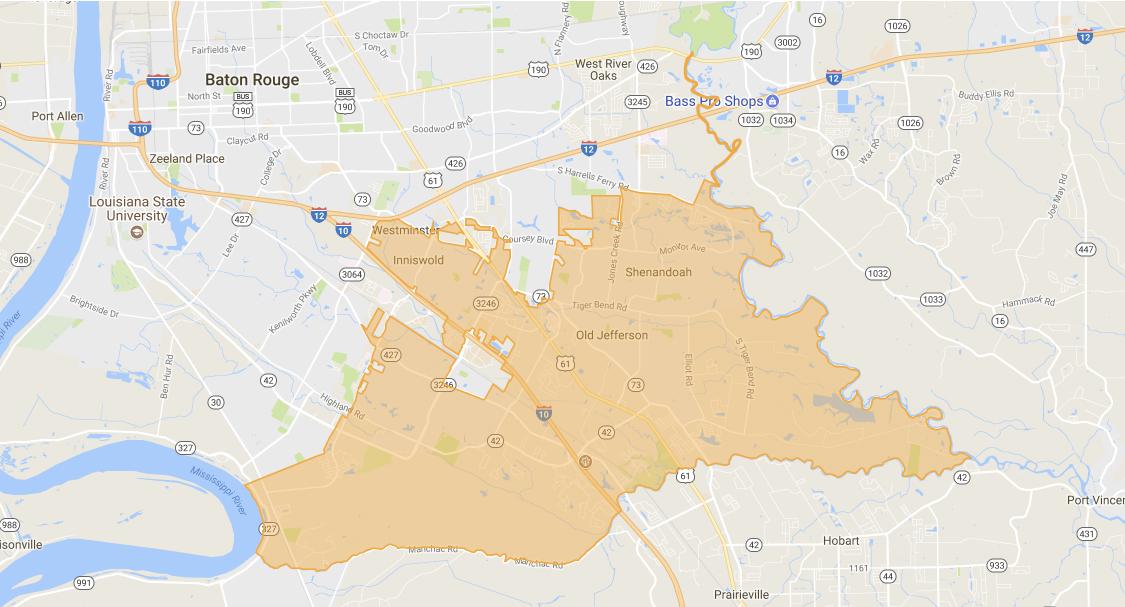Residents of the newly-incorporated city of St. George will vote on a tax change that could have serious implications for the economic futures of both St. George and Baton Rouge, amidst heated political debates between the cities’ leaders.
On Dec. 7, St. George residents will vote on a ballot measure that, if passed, would transfer control of the revenue from the sales tax collected in the new city – which is estimated to total $48 million annually – from East Baton Rouge Parish to St. George’s city government.
Once just a wealthy suburb of Baton Rouge, St. George officially separated from the state capital in 2019 as part of an effort to create an independent school district. Led primarily by wealthy, white residents of East Baton Rouge Parish, St. George’s fight to secede from Baton Rouge stemmed from dissatisfaction with the city-parish government.
“St. George was born from the effort to create a local independent school district in the southeastern part of East Baton Rouge Parish,” the new city’s website reads. “We have witnessed the further decline of our public school system, skyrocketing murder and crime rates, further decay of our parish infrastructure, unprecedented exodus of our friends and families from the parish and a complete lack of trust in our city-parish leadership.”
Now the fifth-most populated city in Louisiana, St. George remains controversial in East Baton Rouge Parish politics.
While residents of St. George have argued the city’s creation was necessary for their families’ prosperity, others have criticized St. George as a state-sanctioned form of white flight. The NAACP, for example, has expressed concern that the new city may exacerbate “segregation and unequal resource distribution” in the parish.
Over the past several months, East Baton Rouge Parish Mayor-President Sharon Weston-Broome’s administration and St. George leaders have been unable to agree on how to fund St. George.
“We had a mediation last week that lasted for several hours, and nothing happened,” Andrew Murill, the chair of the St. George Transition District told the Greater Baton Rouge Business Report this past Tuesday. “There was no movement. All I’ve heard about is wanting to wait until after the election.”
Understood in the context of this heated debate, the Dec. 7 ballot measure represents more than a minor tax tweak; it will determine the extent to which St. George will have control over its own tax revenue — and where that revenue goes.
If passed, the amendment would give St. George control over its sales tax revenue regardless of the status of any intergovernmental agreement reached between the city-parish and St. George.
Proponents of the amendment argue that giving the St. George government control over its sales tax revenue is common sense.
“Why would it not pass?” Murill asked. “Even if you don’t like St. George, bankrupting yourself and potentially the parish to teach us a lesson seems like a foolhardy expedition … It’s not going to fail.”
In practice, whether the amendment failing would mean that St. George goes bankrupt is unclear. Should the amendment fail, the St. George Transition District would continue to serve as the city’s taxation authority, making it unlikely that St. George residents would go without necessary services in the near future.
For others, the choice to pass the Dec. 7 ballot measure is more complicated.
“I can see both sides of the issue,” said agricultural economics senior and Baton Rouge resident Ali Fontenot. “On one hand, I understand why St. George would want their tax money to be used. But on the other hand, without tax revenue from St. George, a lot of the publicly funded things that we rely on like libraries and public schools might be under fire. I get why St. George’s citizens might want this, but for the rest of the parish, things aren’t so clear.”
Polling places will be open in St. George from 7 a.m. to 8 p.m. on Dec. 7. The deadline to request an absentee ballot is Dec. 3.








